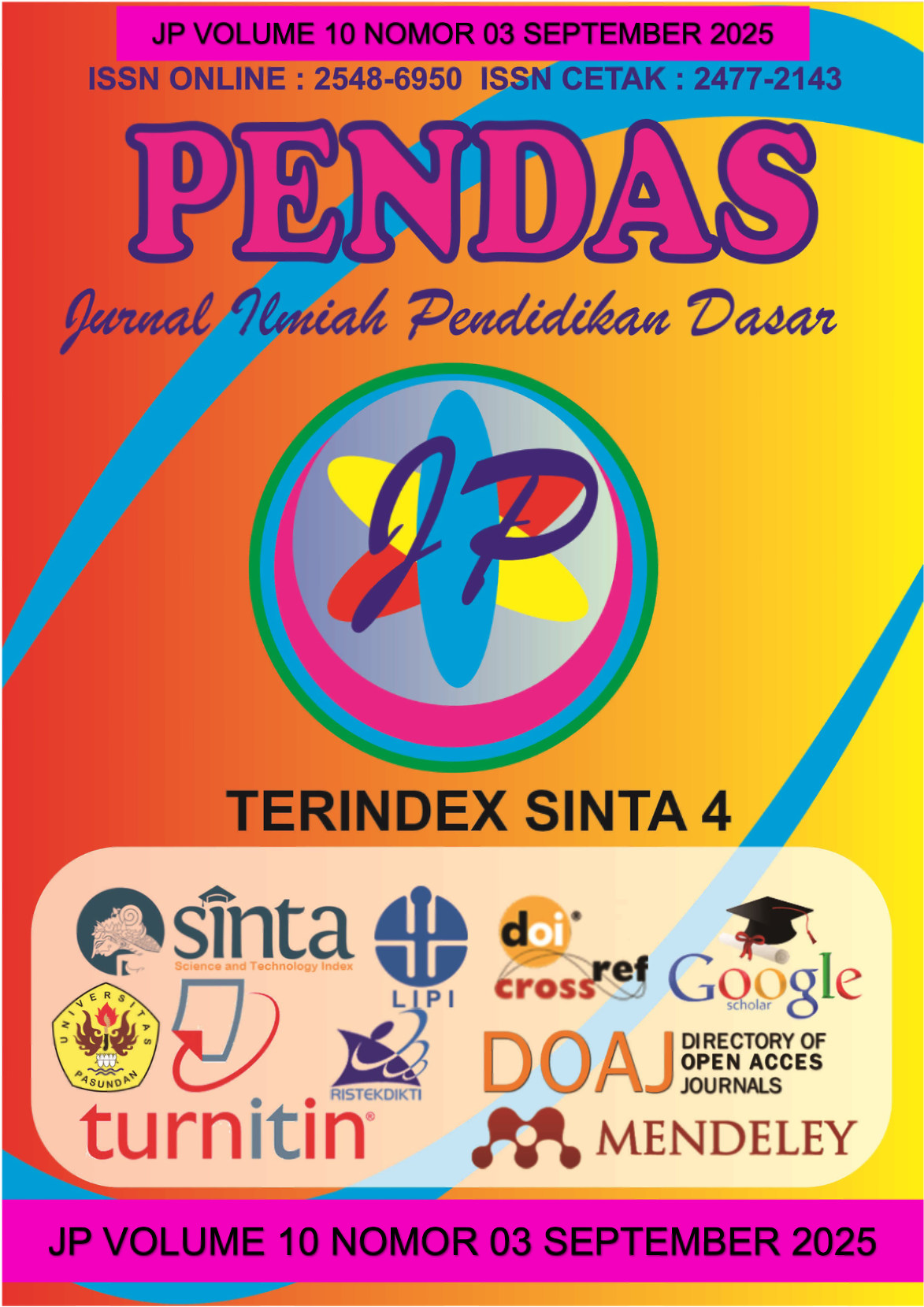KESADARAN METAKOGNITIF DALAM MENULIS TEKS PROSEDUR SISWA KELAS XI FASE F SMKN 1 SOLOK SELATAN
DOI:
https://doi.org/10.23969/jp.v10i03.32799Abstract
Metacognitive knowledge is an important aspect that can help students achieve success in writing. Success in writing is greatly influenced by metacognitive knowledge bases such as personal, task, and strategy. Therefore, this study aims to determine students' metacognitive awareness in writing procedural texts of grade XI Phase F students of SMKN 1 Solok Selatan. This type of research is quantitative with descriptive methods. The sample in this study was 95 grade XI students at SMKN 1 Solok Selatan. Data collection was carried out using questionnaires and interviews. Data analysis was carried out in two ways, namely descriptive analysis for questionnaire data and content analysis for interview results. The results of this study show two things, namely: First, the level of metacognitive awareness and metacognitive strategies in writing procedural texts of students is classified as very high with a percentage of 80.78%. In terms of increasing awareness, students have knowledge that is classified as high with a percentage of 74.63%. In terms of monitoring and evaluation which is classified as very high with a percentage of 85.28%, and in terms of control and regulation it is also classified as very high with a percentage of 82.43%. Second, the metacognitive strategies used by students in writing involve several stages: planning, which involves selecting a topic, understanding the concept of the material, and gathering relevant information. The next stage is development, which involves developing ideas and identifying any obstacles encountered. Finally, evaluation involves summarizing the text to ensure it adheres to linguistic rules and structure.
Keywords: Metacognitive Awareness, Writing, Procedural Text
Downloads
References
Andriani, Lati, dkk. 2023. Pengaruh
Proses Menulis dan Kognitif
terhadap Kemampuan Menulis
Teks Naratif Siswa. Diglosia: Jurnal
Kajian Bahasa, Sastra, dan
Pengajarannya Volume 6 Nomor 2.
Baruta, Y. (2023). Asesmen
Pembelajaran pada Kurikulum
Merdeka: Pendidikan Anak Usia
Dini, Pendidikan Dasar, dan
Pendidikan Menengah. Penerbit
P4I.
Handayani, Wahyuni. 2020.
Kesadaran Metakognitif Membaca
Dan Kemampuan Memahami Teks
Sains Pada Mahasiswa Pendidikan
Fisika. Jurnal Pendidikan Fisika
Vol. 8 No. 1, Maret 2020.
Jaarvis, Matt. 2021. Psikologi Kognitif:
Seri Teori Psikologi. Jakarta:
Nusamedia.
Maratus Sholihah, Siti Zubaidah, S. M.
(2016). Memberdayakan
Keterampilan Metakognitif Dan
Hasil Belajar Kognitif Siswa
Dengan Model Pembelajaran
Reading Concept Map-Reciprocal
Teaching ( Remap Rt ). 2017, 628–
633.
Mustika, I., Sugandi, A. I. 2019.
Pengembangan Model
Pembelajaran Menulis Teks Cerita
Pendek Berbasis Pendekatan
Metakognitif bagi Siswa SMP. 8(2).
Novia, H., Kaniawati, I., & Rusdiana,
D. (2016). Identifikasi Pengetahuan
Metakognisi Calon Guru Fisika. V,
SNF2016-OER-13-SNF2016-OER-
18.
https://doi.org/10.21009/03050104
03
Ramadhanti & Yanda. (2022).
Pembelajaran Menulis Teks Suatu
Pedendekatan Kognitif.
Deepublish.
Ramadhanti & Yanda. (2021).
Students’ Metacognitive
Awareness and Its Impact on
Writing Skill. International Journal
of Language Education Volume 5,
Number 3 .Ramadhanti & Yanda. (2023). Self-
Report To Investigate Of
Metacognition Growth In Writing.
Journal of Applied Studies in
Language. Volume 7 Issue 1 (Jun
2023), p. 75—85.
Satrian, A., & Eriyani, E. (2018).
Kemampuan Metakognisi Menulis
Mahasiswa Semester II STKIP
YPM Bangko. Jurnal PELITRA.
1(2).
Sugiyono. 2013. Metode Penelitian
Pendiikan. Bandung: Alfabeta.
Susilowati, Tintin. 2023. Membangun
Metakognitif dalam Menulis
Menggunakan Teknik Scaffolding.
Prosiding PIBSI XLV UPGRIS
2023.
Wardana, Rendy Wikrama. 2021.
Identifikasi Kesadaran Metakognitif
Peserta Didik dalam Pembelajaran
Fisika. Jurnal Pendidikan Fisika
Vol. 8 No. 1, Maret 2020. t
Downloads
Published
Issue
Section
License
Copyright (c) 2025 Pendas : Jurnal Ilmiah Pendidikan Dasar

This work is licensed under a Creative Commons Attribution 4.0 International License.














































